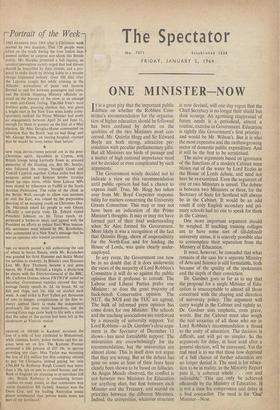ONE MINISTER NOW
IT is a great pity that the important public debate on whether the Robbins Com- mittee's recommendation for the organisa- tion of higher education should be followed has been confused by debate on the qualities of the two Ministers most con- cerned. Mr. Quintin Hogg and Sir Edward Boyle are both strong, attractive per- sonalities with peculiar parliamentary gifts. But all Ministers are birds of passage and a matter of high national importance must not be decided or even complicated by such arguments.
The Government wisely decided not to indicate a view on this recommendation until public opinion had had a chance to express itself. True, Mr. Hogg has taken over from Mr. Boyd Carpenter responsi- bility for matters concerning the University Grants Committee. This may or may not have been an indication of the Prime Minister's thoughts. It may or may not have formed part of their final understanding when Sir Alec formed his Government. More likely it was a recognition of the fact that Quintin Hogg, shorn of responsibility for the North-East and for leading the House of Lords, was quite clearly under- employed.
In any event, the Government can now be in no doubt that if it does underwrite the views of the majority of Lord Robbins's Committee it will do so against the public opinion that it professes to consult. The Labour and Liberal Parties prefer one Minister : so does the great majority of back-bench Conservative opinion. The NUT, the NUS and the TUC are agreed. The bulk of informed press opinion has come down for one Minister. The schools and the teaching associations are reinforced by a minority of university support. Yet Lord Robbins—as Dr. Gardner's close argu- ment in the Spectator of December 13 shows—has most formidable support. The universities are overwhelmingly for the recommendation, but the universities are almost alone. This in itself does not argue that they are wrong. But as the debate has gone on some at least of their fears have clearly been shown to be based on fallacies. As Angus Maude observed, the conflict is not between two Ministers for Education (or anything else), but first between each Minister and the Treasury, and second on priorities between the different Ministers. Indeed, the universities, whatever structure is now devised, will one day regret that the Chief Secretary is no longer their shield but their scourge. An agonising reappraisal of future .needs is a periodical, almost a routine, exercise in Government. Education is rightly this Government's first priority : and would be Mr. Wilson's. But it is also the most expensive and the swiftest-growing sector of domestic public expenditure. And it will be the first to be scrutinised.
The naïve arguments based on ignorance of the functions of a modern Cabinet were blown out of the water by Lord Eccles in the House of Lords debate, and need not here be re-examined. Even the argument of one or two Ministers is unreal. The debate is between two Ministers or three, for the Secretary of State for Scotland will always be in the Cabinet. It would be an odd result if only English secondary and pri- mary schools had no one to speak for them in the Cabinet.
One more important argument should be weighed. If teaching training colleges are to have some sort of (ill-defined) university status, it is scarcely possible also to contemplate their separation from the Ministry of Education.
It must, however, be conceded that what remains of the case for a separate Ministry of Arts and Science is still formidable, both because of the quality of the spokesmen and the depth of their conviction.
Dr. Gardner goes so far as to say that the proposal for a single Minister of Edu- cation is unacceptable to almost all those concerned with the shaping and direction of university policy. This argument will carry weight in the Cabinet and rightly so. Dr. Gardner uses emphatic, even grave, words. But the Cabinet must also weigh the real anxieties of all those who see in Lord Robbins's recommendation a threat to the unity of education. The decision is difficult, and will get no simpler. So the arguments for delay, at least until after a general election, will be canvassed. Yet the real need is to see that those now deprived of a full chance of further education are no longer denied it. The need is for educa- tion to be in reality, as the Minority Report puts it, 'a coherent whole . . . one and indivisible.' This can only be achieved efficiently by the Ministry of Education. It is not a time for compromise and delay is a bad counsellor. The need is for 'One Minister—Now.






























 Previous page
Previous page